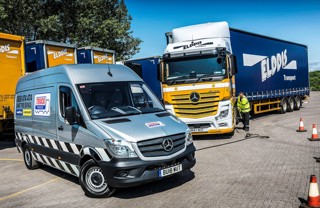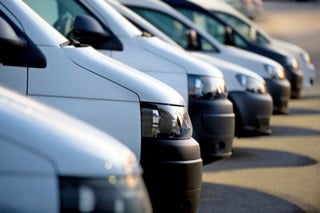The changing mobility landscape will have a transformational effect on many aspects of the truck industry.
Diesel-powered vehicles will be joined by hydrogen fuel cell and battery electric LGVs and HGVs, while autonomous and connected technologies will driver greater efficiencies and lower operating costs for fleet operators in the future, said Mubarak Moosa, consulting director at Frost and Sullivan mobility analysts.
Moosa was speaking at the launch of Goodyear Total Mobility, which is the tyre manufacturer’s new end-to-end offering which brings together its range of truck tyres, preventive maintenance solutions and 2,000 TruckForce service network locations across Europe to reduce costs and vehicle downtime.
“Trucking and commercial vehicles may not be a glamorous sector in comparison with passenger cars, but it is definitely the backbone for societal and economic development,” Moosa added.
“Mega trends such as urbanisation, connectivity, digitalisation, online retail and new business models will impact and require a well-established trucking sector to reinvent itself.
“And we believe in the future, fleet managers will adopt smart, eco-friendly and connected technologies which will allow them to improve total cost of ownership and, at the same time, improve efficiency.”
Tyres have a key role to play in the shifting mobility landscape, said David Anckaert, vice-president Goodyear Commercial Europe.
“Autonomous technologies will see us working with vehicle manufacturers to understand how they are developing robotrucks and what they are thinking about platooning so we understand how we can support those trends,” he added.
“Connected technologies can allow the fleet manager to get connected to the tyre because if, for example, the conditions become slippery, the tyres are going to have the first information about what is happening on the road.
“There will be major changes in the powertrain and this will be electric and hydrogen fuel cell technology.
“When Goodyear looks at these trucks we see a need for battery space, so it is going to change the way we think about the size and load-carrying capacity of those tyres.
“Electric motors also have high torque, so we are always thinking about what we are going to do with the traction that is required.
“These are key trends that have a direct impact on us providing a total mobility offer to our fleet customers.”
While many of these developments remain challenges for the future, Anckaert said Goodyear has launched its Total Mobility product to tackle many of the issues faced by fleets today.
A Road Haulage Association (RHA)survey of goods vehicle costs found the purchase price of tyres typically accounts for just 3% of the operating cost of a truck (30% driver wages, 26% fuel, 5% maintenance, 10% deprecation, 6% insurance, 20% others including tax and interest), but they can affect much more.
“Our Total Mobility solution will be able to influence more than 40% of the total operating cost of a fleet,” said Anckaert.
“As well as tyres we can impact fuel consumption, driver retention and maintenance cost. We can help our fleets do their jobs better.”
At the Goodyear Total Mobility launch event held at its Mireval testing facility in France, the tyre manufacturer also demonstrated its Drive-Over Reader.
This uses a ground-mounted sensor to scan the tyre and vehicle parameters when driving over, analysing tyre pressure, tread depth, axle load and total weight.
The reader is able to read licence plates and reports its findings directly to the fleet manager, allowing them to address any issues identified.
Goodyear says this will help reduce the number of tyre-related breakdowns and incidents, fuel consumption due to under-inflated tyres, frequency of tyre renewal, tyre maintenance costs, human errors in manual measuring and financial penalties incurred for overload and late deliveries.
The company also launched two truck tyre ranges: KMax Gen-2 and FuelMax Gen-2. These replace the existing KMax and FuelMax products, which were launched in 2013.
Goodyear says KMax Gen-2 offers up to 25% better all-weather capability than its predecessor, as well as 15% more damage resistance and 5% higher fuel efficiency.
FuelMax Gen-2 provides up to 10% improved mileage, 30% greater all-weather capability as well as less noise than FuelMax, but retains the same level of fuel efficiency said Goodyear.




















Login to comment
Comments
No comments have been made yet.